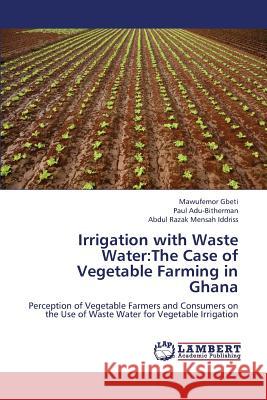Irrigation with Waste Water: The Case of Vegetable Farming in Ghana » książka
Irrigation with Waste Water: The Case of Vegetable Farming in Ghana
ISBN-13: 9783659339172 / Angielski / Miękka / 2013 / 76 str.
In contemporary times, people have come to realize the importance of vegetables as rich source of vitamins and minerals which aid to protect their body against infection and diseases. This knowledge has increased the demand of both exotic and indigenous vegetables in the cities as such any available space in the cities has become a major farming centre for vegetable producers. On the other hand, there has been an increasing incidence of food borne diseases which is link to enteric pathogenic micro organisms found in fecal material and for that matter waste water. It implies that there might be possible contamination of vegetables that are irrigated with waste water. This means that untreated waste water use in vegetable irrigation can pose a serious Public Health problem to both consumers and producers. Therefore, the WHO has set standards for waste water reuse. However, the waste water use for vegetable irrigation in the study area is not treated and also, perception of consumers and farmers about the use of untreated waste water in vegetable irrigation in the study area is not known, hence the study seeks to find out the farmers as well as consumers perceptions about the problem.
In contemporary times, people have come to realize the importance of vegetables as rich source of vitamins and minerals which aid to protect their body against infection and diseases. This knowledge has increased the demand of both exotic and indigenous vegetables in the cities as such any available space in the cities has become a major farming centre for vegetable producers. On the other hand,there has been an increasing incidence of food borne diseases which is link to enteric pathogenic micro organisms found in fecal material and for that matter waste water. It implies that there might be possible contamination of vegetables that are irrigated with waste water. This means that untreated waste water use in vegetable irrigation can pose a serious Public Health problem to both consumers and producers. Therefore, the WHO has set standards for waste water reuse. However, the waste water use for vegetable irrigation in the study area is not treated and also, perception of consumers and farmers about the use of untreated waste water in vegetable irrigation in the study area is not known, hence the study seeks to find out the farmers as well as consumers perceptions about the problem.











